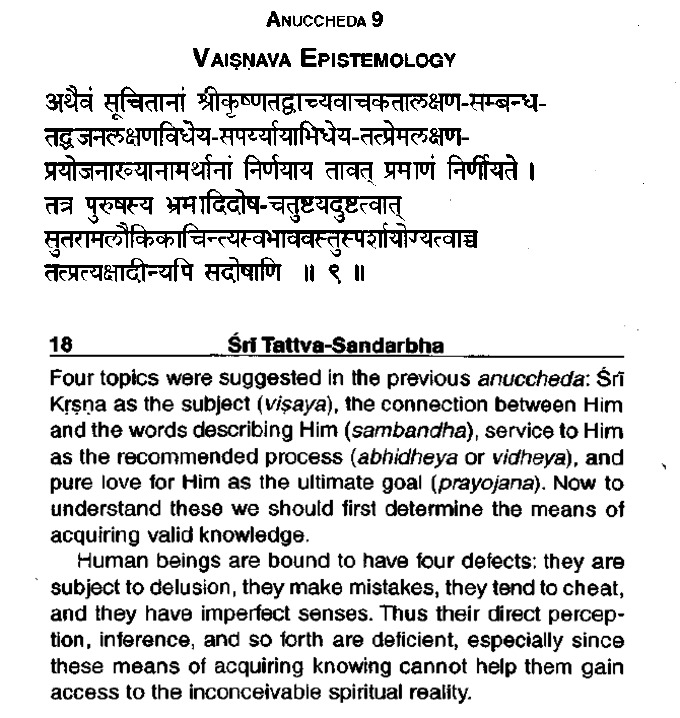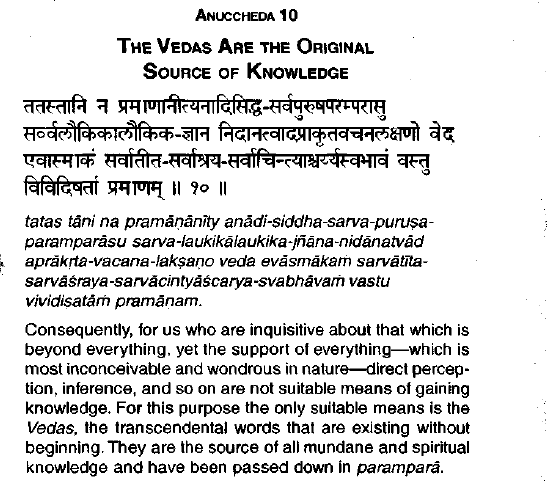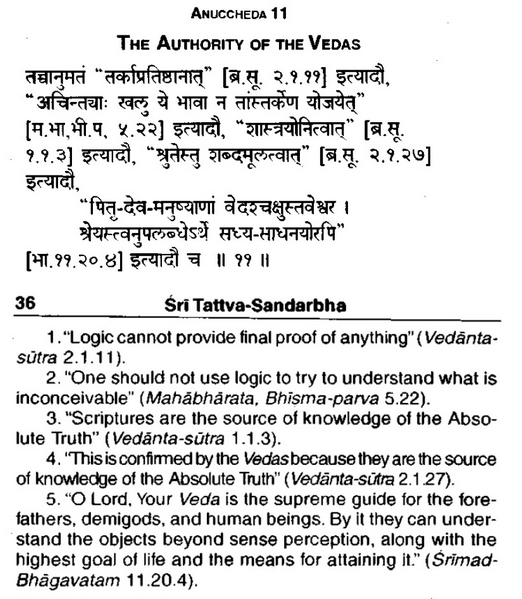How do Buddhists defend the sufficiency of pratyakṣa & anumāna pramāṇas against the Vedantic claims that only sabda-pramāṇa is objectively infallible?
-1
votes
4
answers
233
views
Among the various pramāṇas, or means of valid knowledge in Indian epistemologies, it is generally accepted that Buddhism recognizes two pramāṇas. As stated thus :-
> Many schools of Buddhism posit two forms of pramāṇa:
>
> **direct perception (pratyakṣa) and
> inference (anumāna)**
>
> **Direct perception is a non-conceptual cognition that directly
> apprehends an object, and inference is based on reasoning.**
However, this approach of reliance on only two pramāṇas, coupled with the rejection of scriptural or Vedic testimony (śabda-pramāṇa), has over the time drawn criticism from numerous rival schools among which the most prominent have been the Vedāntic commentators and theologians.
This may be seen for instance from a brief study of some Anucchedas of the Tattva-sandarbha, a work of Śrī Jīva Gosvāmī, a Vaiṣṇava theologian and Vedāntin of the Acintya-bhedābheda school. In the relevant section, while elaborating on the epistemology of his tradition he lists the flaws with all other means of knowledge such perception and inference.
Tattva Sandarbha Anuccheda 9
 Therefore owing to these defects, the only valid sources of knowledge about the Absolute (the ultimate truth or God) are the Vedas or Vedic scriptures, which are considered by tradition to be apauruṣeya (authorless) since they are supposed to have manifested directly from God, perfect, and transmitted through an unbroken paramparā (disciplic succession).
Therefore owing to these defects, the only valid sources of knowledge about the Absolute (the ultimate truth or God) are the Vedas or Vedic scriptures, which are considered by tradition to be apauruṣeya (authorless) since they are supposed to have manifested directly from God, perfect, and transmitted through an unbroken paramparā (disciplic succession).
 Further, in order to establish the superiority of scriptural authority (śabda-pramāṇa) over logical reasoning or inference, a number of proofs are cited.
Further, in order to establish the superiority of scriptural authority (śabda-pramāṇa) over logical reasoning or inference, a number of proofs are cited.
 In the Lengthy commentary to the 10th anuccheda, it may be seen in particular that the criticism is directed at the Standpoint of the Buddhists -
> The Vedas (sabda-pramana ) are the only effective means for acquiring
> transcendental knowledge. **The Vedas inform us about the soul's
> existence beyond the body**, about the planets of the spiritual world,
> and about the Supreme Lord, , His pastimes, and other matters. All
> these subjects are beyond the reach of our sensory and mental
> faculties.
> **Philosophers such as the Buddhists, who do not accept the Vedas,
> cannot justifiably say anything positive about transcendence, let
> alone the way to attain it without sabda. Sabda-pramana (i.e
> Vedic/Scriptural testimony) is so important that although Vaisnavas
> count Lord Buddha among the incarnations of the Lord on the strength
> of Vedic testimony, they reject His philosophy because it is not based
> on sabda-pramana.**
~ Commentary to Anuccheda 10
Similarly the Buddhist View of the momentariness of consciousness too is criticised Elsewhere in the same work as -
> **The Vedanta explains that when a person looks at an object there
> arises a particular mental state, called vrtti, which the soul
> perceives. The mental state itself is not the perceiver. But the
> Buddhists, lacking all knowledge about the soul, mistake this
> temporary, ever-changing vrtti, which is noneternal ever-constantly
> changing, for real consciousness.** This point is further clarified with
> the analogy of the life air. Air is one, but air within the body has
> various names, such as prana, apana, and samana, according to the
> function it performs. Similarly, the soul is one, but while in the
> body it manifests consciousness, which appears many-branched and
> ever-changing. For example, sweetened cow's milk gives rise to
> different mental states when perceived with different senses: to the
> eyes it is white, to the tongue sweet, and so on. So it is only the
> mental state, affected by varieties of sense perception, that appears
> and disappears. The living entity is a fractional part of the Supreme
> Lord, and since the Lord is conscious and eternal, the living entity
> must have these qualities as well, in as much as a gold nugget shares
> the qualities of the mother lode. The purpose of explaining the
> conscious and eternal quality of the soul with logic and personal
> experience is to help us develop an understanding of the Supersoul.
~ Commentary to Anuccheda 53.3
----------
With respect to the Above citations, I would now like to pose some Questions:-
- Given that perception and inference are indeed fallible and prone to error, how does the Buddhist tradition establish a reliable epistemological foundation for knowledge of ultimate reality (e.g., Nirvāṇa or Sunyata)?
- What is the Buddhist position on scriptural authority in general, and how is reliance on an external scripture claimed to be authorless and coming directly from God via a disciplic succession, viewed in light of Buddhist pramāṇa theories?
- How would Buddhist philosophers identify the main shortcomings or philosophical weaknesses in the Vedantic insistence on Vedic knowledge as the sole valid source for understanding the Absolute?
- Is there an alternative epistemic framework in Buddhism that addresses the same problem of cognitive fallibility without relying on a fixed scriptural authority?
In the Lengthy commentary to the 10th anuccheda, it may be seen in particular that the criticism is directed at the Standpoint of the Buddhists -
> The Vedas (sabda-pramana ) are the only effective means for acquiring
> transcendental knowledge. **The Vedas inform us about the soul's
> existence beyond the body**, about the planets of the spiritual world,
> and about the Supreme Lord, , His pastimes, and other matters. All
> these subjects are beyond the reach of our sensory and mental
> faculties.
> **Philosophers such as the Buddhists, who do not accept the Vedas,
> cannot justifiably say anything positive about transcendence, let
> alone the way to attain it without sabda. Sabda-pramana (i.e
> Vedic/Scriptural testimony) is so important that although Vaisnavas
> count Lord Buddha among the incarnations of the Lord on the strength
> of Vedic testimony, they reject His philosophy because it is not based
> on sabda-pramana.**
~ Commentary to Anuccheda 10
Similarly the Buddhist View of the momentariness of consciousness too is criticised Elsewhere in the same work as -
> **The Vedanta explains that when a person looks at an object there
> arises a particular mental state, called vrtti, which the soul
> perceives. The mental state itself is not the perceiver. But the
> Buddhists, lacking all knowledge about the soul, mistake this
> temporary, ever-changing vrtti, which is noneternal ever-constantly
> changing, for real consciousness.** This point is further clarified with
> the analogy of the life air. Air is one, but air within the body has
> various names, such as prana, apana, and samana, according to the
> function it performs. Similarly, the soul is one, but while in the
> body it manifests consciousness, which appears many-branched and
> ever-changing. For example, sweetened cow's milk gives rise to
> different mental states when perceived with different senses: to the
> eyes it is white, to the tongue sweet, and so on. So it is only the
> mental state, affected by varieties of sense perception, that appears
> and disappears. The living entity is a fractional part of the Supreme
> Lord, and since the Lord is conscious and eternal, the living entity
> must have these qualities as well, in as much as a gold nugget shares
> the qualities of the mother lode. The purpose of explaining the
> conscious and eternal quality of the soul with logic and personal
> experience is to help us develop an understanding of the Supersoul.
~ Commentary to Anuccheda 53.3
----------
With respect to the Above citations, I would now like to pose some Questions:-
- Given that perception and inference are indeed fallible and prone to error, how does the Buddhist tradition establish a reliable epistemological foundation for knowledge of ultimate reality (e.g., Nirvāṇa or Sunyata)?
- What is the Buddhist position on scriptural authority in general, and how is reliance on an external scripture claimed to be authorless and coming directly from God via a disciplic succession, viewed in light of Buddhist pramāṇa theories?
- How would Buddhist philosophers identify the main shortcomings or philosophical weaknesses in the Vedantic insistence on Vedic knowledge as the sole valid source for understanding the Absolute?
- Is there an alternative epistemic framework in Buddhism that addresses the same problem of cognitive fallibility without relying on a fixed scriptural authority?
 Therefore owing to these defects, the only valid sources of knowledge about the Absolute (the ultimate truth or God) are the Vedas or Vedic scriptures, which are considered by tradition to be apauruṣeya (authorless) since they are supposed to have manifested directly from God, perfect, and transmitted through an unbroken paramparā (disciplic succession).
Therefore owing to these defects, the only valid sources of knowledge about the Absolute (the ultimate truth or God) are the Vedas or Vedic scriptures, which are considered by tradition to be apauruṣeya (authorless) since they are supposed to have manifested directly from God, perfect, and transmitted through an unbroken paramparā (disciplic succession).
 Further, in order to establish the superiority of scriptural authority (śabda-pramāṇa) over logical reasoning or inference, a number of proofs are cited.
Further, in order to establish the superiority of scriptural authority (śabda-pramāṇa) over logical reasoning or inference, a number of proofs are cited.
 In the Lengthy commentary to the 10th anuccheda, it may be seen in particular that the criticism is directed at the Standpoint of the Buddhists -
> The Vedas (sabda-pramana ) are the only effective means for acquiring
> transcendental knowledge. **The Vedas inform us about the soul's
> existence beyond the body**, about the planets of the spiritual world,
> and about the Supreme Lord, , His pastimes, and other matters. All
> these subjects are beyond the reach of our sensory and mental
> faculties.
> **Philosophers such as the Buddhists, who do not accept the Vedas,
> cannot justifiably say anything positive about transcendence, let
> alone the way to attain it without sabda. Sabda-pramana (i.e
> Vedic/Scriptural testimony) is so important that although Vaisnavas
> count Lord Buddha among the incarnations of the Lord on the strength
> of Vedic testimony, they reject His philosophy because it is not based
> on sabda-pramana.**
~ Commentary to Anuccheda 10
Similarly the Buddhist View of the momentariness of consciousness too is criticised Elsewhere in the same work as -
> **The Vedanta explains that when a person looks at an object there
> arises a particular mental state, called vrtti, which the soul
> perceives. The mental state itself is not the perceiver. But the
> Buddhists, lacking all knowledge about the soul, mistake this
> temporary, ever-changing vrtti, which is noneternal ever-constantly
> changing, for real consciousness.** This point is further clarified with
> the analogy of the life air. Air is one, but air within the body has
> various names, such as prana, apana, and samana, according to the
> function it performs. Similarly, the soul is one, but while in the
> body it manifests consciousness, which appears many-branched and
> ever-changing. For example, sweetened cow's milk gives rise to
> different mental states when perceived with different senses: to the
> eyes it is white, to the tongue sweet, and so on. So it is only the
> mental state, affected by varieties of sense perception, that appears
> and disappears. The living entity is a fractional part of the Supreme
> Lord, and since the Lord is conscious and eternal, the living entity
> must have these qualities as well, in as much as a gold nugget shares
> the qualities of the mother lode. The purpose of explaining the
> conscious and eternal quality of the soul with logic and personal
> experience is to help us develop an understanding of the Supersoul.
~ Commentary to Anuccheda 53.3
----------
With respect to the Above citations, I would now like to pose some Questions:-
- Given that perception and inference are indeed fallible and prone to error, how does the Buddhist tradition establish a reliable epistemological foundation for knowledge of ultimate reality (e.g., Nirvāṇa or Sunyata)?
- What is the Buddhist position on scriptural authority in general, and how is reliance on an external scripture claimed to be authorless and coming directly from God via a disciplic succession, viewed in light of Buddhist pramāṇa theories?
- How would Buddhist philosophers identify the main shortcomings or philosophical weaknesses in the Vedantic insistence on Vedic knowledge as the sole valid source for understanding the Absolute?
- Is there an alternative epistemic framework in Buddhism that addresses the same problem of cognitive fallibility without relying on a fixed scriptural authority?
In the Lengthy commentary to the 10th anuccheda, it may be seen in particular that the criticism is directed at the Standpoint of the Buddhists -
> The Vedas (sabda-pramana ) are the only effective means for acquiring
> transcendental knowledge. **The Vedas inform us about the soul's
> existence beyond the body**, about the planets of the spiritual world,
> and about the Supreme Lord, , His pastimes, and other matters. All
> these subjects are beyond the reach of our sensory and mental
> faculties.
> **Philosophers such as the Buddhists, who do not accept the Vedas,
> cannot justifiably say anything positive about transcendence, let
> alone the way to attain it without sabda. Sabda-pramana (i.e
> Vedic/Scriptural testimony) is so important that although Vaisnavas
> count Lord Buddha among the incarnations of the Lord on the strength
> of Vedic testimony, they reject His philosophy because it is not based
> on sabda-pramana.**
~ Commentary to Anuccheda 10
Similarly the Buddhist View of the momentariness of consciousness too is criticised Elsewhere in the same work as -
> **The Vedanta explains that when a person looks at an object there
> arises a particular mental state, called vrtti, which the soul
> perceives. The mental state itself is not the perceiver. But the
> Buddhists, lacking all knowledge about the soul, mistake this
> temporary, ever-changing vrtti, which is noneternal ever-constantly
> changing, for real consciousness.** This point is further clarified with
> the analogy of the life air. Air is one, but air within the body has
> various names, such as prana, apana, and samana, according to the
> function it performs. Similarly, the soul is one, but while in the
> body it manifests consciousness, which appears many-branched and
> ever-changing. For example, sweetened cow's milk gives rise to
> different mental states when perceived with different senses: to the
> eyes it is white, to the tongue sweet, and so on. So it is only the
> mental state, affected by varieties of sense perception, that appears
> and disappears. The living entity is a fractional part of the Supreme
> Lord, and since the Lord is conscious and eternal, the living entity
> must have these qualities as well, in as much as a gold nugget shares
> the qualities of the mother lode. The purpose of explaining the
> conscious and eternal quality of the soul with logic and personal
> experience is to help us develop an understanding of the Supersoul.
~ Commentary to Anuccheda 53.3
----------
With respect to the Above citations, I would now like to pose some Questions:-
- Given that perception and inference are indeed fallible and prone to error, how does the Buddhist tradition establish a reliable epistemological foundation for knowledge of ultimate reality (e.g., Nirvāṇa or Sunyata)?
- What is the Buddhist position on scriptural authority in general, and how is reliance on an external scripture claimed to be authorless and coming directly from God via a disciplic succession, viewed in light of Buddhist pramāṇa theories?
- How would Buddhist philosophers identify the main shortcomings or philosophical weaknesses in the Vedantic insistence on Vedic knowledge as the sole valid source for understanding the Absolute?
- Is there an alternative epistemic framework in Buddhism that addresses the same problem of cognitive fallibility without relying on a fixed scriptural authority?
Asked by user31447
Sep 7, 2025, 10:38 AM
Last activity: Jan 2, 2026, 03:55 AM
Last activity: Jan 2, 2026, 03:55 AM